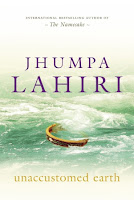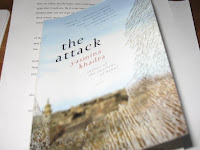 Jhumpa Lahiri’s latest book of short stories, Unaccustomed Earth, could possibly be the best book I’ve read so far this year. Achingly beautiful prose echoes through each of the stories, and they all have such a resounding and impressive narrative voice that it’s impossible to put the book down once you’ve begun. The stories are as rich and inherently detailed as the best novels aspire to be, which just goes to show that Lahiri’s skills as a storyteller are paramount. She’s one of the best writers working in English today. I know that’s a bold statement, but I’d put forth that she rivals Alice Munro when it comes to ensuring that the form of the short story isn’t relegated to beginner’s classes and college literary journals. The work is powerful, passionate, cutting and emotionally driven. And while each of her stories work with similar themes, first and second generation East Indian families in America, they’re also each distinct both in terms of their internal rhythms and the morals that drive the narratives forward.
Jhumpa Lahiri’s latest book of short stories, Unaccustomed Earth, could possibly be the best book I’ve read so far this year. Achingly beautiful prose echoes through each of the stories, and they all have such a resounding and impressive narrative voice that it’s impossible to put the book down once you’ve begun. The stories are as rich and inherently detailed as the best novels aspire to be, which just goes to show that Lahiri’s skills as a storyteller are paramount. She’s one of the best writers working in English today. I know that’s a bold statement, but I’d put forth that she rivals Alice Munro when it comes to ensuring that the form of the short story isn’t relegated to beginner’s classes and college literary journals. The work is powerful, passionate, cutting and emotionally driven. And while each of her stories work with similar themes, first and second generation East Indian families in America, they’re also each distinct both in terms of their internal rhythms and the morals that drive the narratives forward.
In the first half of the book, Lahiri doesn’t really play with form. The stories are straightforward in the sense that they don’t play with time or traditional methods of storytelling, but they are rich in character development, and they do ache with the everyday heartbreak of life. In the second half of Unaccustomed Earth, Lahiri has written three linked stories. The first two use the second person, which I was resistant to at first, but once I read the last few pages of the book, I understood her choice. You will too. It’s these three linked tales, stories of Hema and Kaushik, characters linked by a common childhood, that will crush your reading soul in the same way any good book should. I don’t want to give anything away so I won’t say anything more about them, just to reiterate that to appreciate them is to appreciate writing at its finest.
PHOTO IN CONTEXT:If I have one criticism, it’s that I’m really not fond of the book’s jacket. Hence no photo, although I guess I could have taken a picture to make it seem less, well, boring.
READING CHALLENGES: I don’t think I’ve read an American author yet for my Around the World in 52 Books. This would be a great one to read for the States. It’s a rich canvas, writing from the perspective of immigrants to the great and fascinatingly flawed country. And while I had Dennis Johnson’s book in mind. I’m going to count this instead. Even if the setting is somewhat secondary to the character development, in a sense, it’s defining of it too, place defines these characters as much as it marginalizes them; it changes their lives from the moment the plane touches down and new homes are built. But it’s also a fascinating study of the idea of what it means to be a part of a second generation in the U.S. How different their lives are from their parents, how charged with being both American and Indian can be, how important it is for history to change perspective.
WHAT’S UP NEXT: I was reading Huckleberry Finn on the ride home (I finished Unaccustomed Earth on a hard cement bench outside of The Bay after having a quick bagel with Sam before heading back up to the craziness that is work these days). But I’m not sure if I’ll continue. Maybe, like I said the other day, I’ll finish The Sealed Letter tonight.
